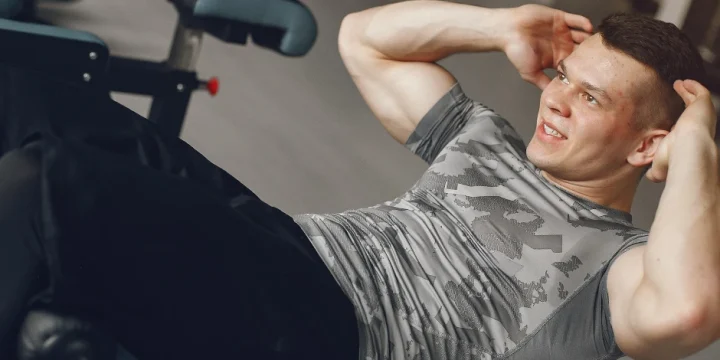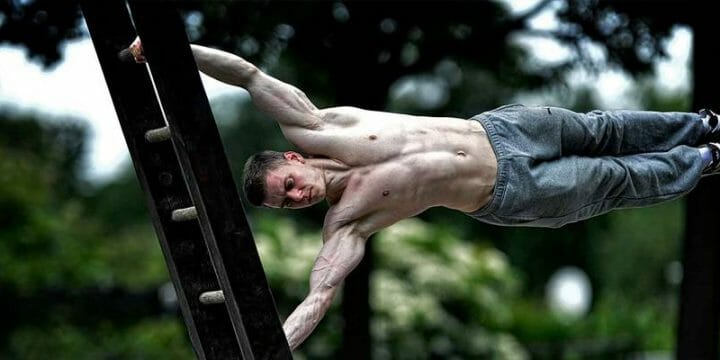As a medical doctor, I've always been keen on integrating evidence-based supplements into patient care for optimal health outcomes.
My interest led me to Andrew Huberman, a renowned neuroscientist, whose supplement recommendations are grounded in scientific research.
Through his interviews, YouTube videos, and podcasts, I've gained insights into effective supplements for sleep, testosterone enhancement, and more.
This article will share my findings and practical applications of Andrew Huberman's supplement advice, along with his fitness and dietary approaches.
Andrew Huberman's Supplements List
Testosterone Boosting Supplements

Andrew emphasizes the significance of healthy testosterone levels and says that before adding any supplements, "the basics" must be in order, which is:
- Good quality sleep.
- A balanced diet.
- Exercise regularly (but not excessively).
- Avoiding prolonged stress.
Once those boxes are checked, he adds two supplements that have helped him: Tongkat Ali and Fadogia agrestis.
In my clinical experience, supplements like Tongkat Ali and Fadogia agrestis have shown promising results in boosting testosterone levels.
Consider the long-term implications of adopting Andrew Huberman's supplement regimen, including potential benefits and risks, to determine if these supplements are suitable for short-term improvements or as part of a sustained health strategy.
Fadogia Agrestis

Fadogia agrestis is a plant native to Nigeria, and the stem is utilized as a herbal medicine to cure various ailments [1].
Andrew explains Fadogia as raising luteinizing hormone (LH), which encourages the testes to create more testosterone to increase testosterone.
Andrew claims to have taken 600 mg daily for 8 to twelve weeks, followed by a few weeks off.
Andrew reports that he constantly tests his blood and hasn't noticed any negative effects of Fadogia on his blood markers.
Tongkat Ali
Tongkat Ali is derived from a plant native to Southeast Asia. There, it is used as a medicinal herb and has a variety of applications, according to the Fitoterapia [2].
Andrew says that Tongkat Ali may boost testosterone and that the amount he takes is 400 mg.
A 2022 meta-analysis of 5 randomized controlled studies found that Tongkat Ali consistently enhanced total testosterone versus placebo. It examined daily dosages ranging from 100 to 600 mg [3].
Andrew recommends:
- Use it early in the day because it has a stimulating impact.
- Taking it daily rather than on an as-needed basis since the impact tends to enhance in the second and third months of use.
- There's no need to cycle it unless something in your blood tests, like liver enzymes, indicates that you should.
"I use 400 mg of tongkat ali daily. I take it first thing in the morning since it has a stimulating impact. I've been using it for many years. I've never cycled it. According to my blood work, this causes a boost in free testosterone and a rise in luteinizing hormone for me."
- Dr. Andrew Huberman, American Neuroscientist
Zinc
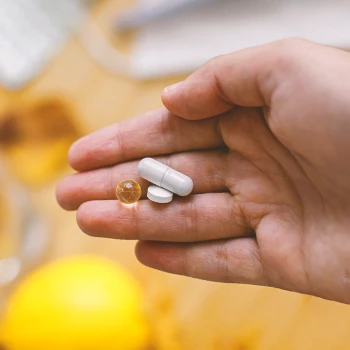
Deficiencies in zinc, vitamin D, and magnesium affect testosterone levels.
Zinc is required to synthesize follicle stimulating hormones and luteinizing hormones, according to the study published in PubMed [4].
In males, luteinizing hormone induces the testes to create testosterone. In other words, a lack of zinc might result in lower testosterone levels.
While the process is distinct in women, inadequate zinc will similarly reduce testosterone levels in women [5].
Andrew hasn't addressed the dose he takes. We do know that the multivitamin he uses includes 15 mg of zinc.
According to National Institutes of Health (NIH) standards, men should take 11 mg daily, and women should take 8 mg with a recommended upper limit of roughly 40 mg for both genders.
Related: Can Zinc Boost Testosterone
Boron
Boron, a trace mineral found in small quantities in food, is part of Andrew Huberman's daily regimen at 2 to 4 mg.
According to the research published in PubMed, it's known to potentially lower sex hormone-binding globulin (SHBG), which can increase the availability of free testosterone [6].
Boron isn't regarded as an essential micronutrient. Hence there is no RDA (recommended daily allowance) amount for it.
On the other hand, the National Institutes of Health (NIH) site recommends that an "acceptable safe limit" of boron for humans is 1-13 mg/day.
Supplements for Cognitive Function

Alpha-GPC
When a fatty acid in soy and other plants decomposes, alpha-GPC (or alpha-glycerophosphocholine) is formed [7].
It improves cognitive function and boosts power output in sportspeople's performance because it appears to activate the brain's chemical acetylcholine.
Alpha-GPC is among Andrew's go-to supplements whenever he wants to challenge himself during a difficult exercise or work session, and he sees it as a long-term contribution to his brain health.
From my observations, Alpha-GPC has significantly enhanced cognitive performance in my patients, especially under stress.
Phenylethylamine (PEA)
PEA, or phenylethylamine, is an organic chemical that increases dopamine levels. PEA is among Andrew Huberman's supplements widely acknowledged as safe and beneficial.
Furthermore, PEA is a naturally occurring chemical in the human body and chocolate. Phenylethylamine helps with anything from improving fitness to improving brain health, mood, and attention.
It encourages the body to produce chemicals that aid in treating disorders such as depression, according to the WebmedCentral [8].
L-Tyrosine
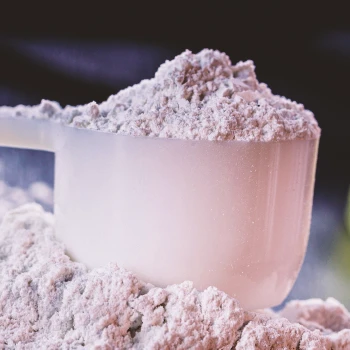
Dr. Huberman regularly uses L-tyrosine, a dopamine producer, to boost brain function (focus and attention).
Many people use this well-known dietary supplement to improve their concentration and focus.
It promotes nerve cell transmission and regulates mood, enhancing brain health, according to the eNeuro [9].
Omega-3 Fatty Acids
These are a form of polyunsaturated fat that the body needs but cannot manufacture independently.
They must be received from food or supplementation. They are classified into three types: docosahexaenoic acid (DHA), alpha-linolenic acid (ALA), and eicosapentaenoic acid (EPA) [10].
According to Dr. Huberman, omega-3 fatty acids are important in many facets of health, including cognitive function, mood control, cardiovascular health, and inflammation control.
Because DHA is a significant component of brain tissue, they are crucial for brain development and health.
Learn More: Best Omega 3 Supplements 2025
Glutamine
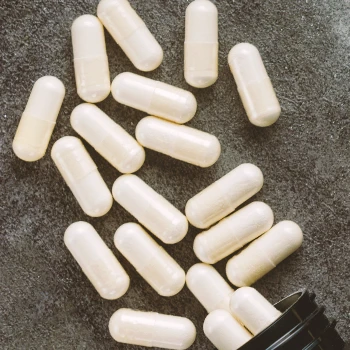
Andrew shows how glutamine might be useful to the brain in his podcast "Nutrients for Brain Health and Performance."
First, glutamine reduces sugar cravings by connecting with the cerebral cortex via glutamine-sensing neurons in the stomach mucosa.
These neurons communicate satisfaction and contentment when they detect the amino acid glutamine.
Second, Andrew discusses glutamine's beneficial impact on cognition in hypoxic situations like high altitudes and sleep apnea [11].
Creatine
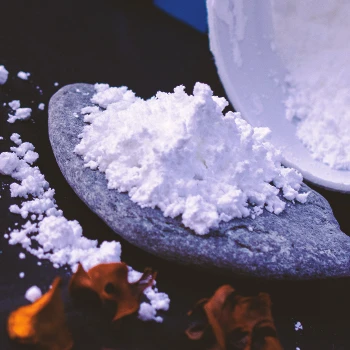
While creatine is a well-known bodybuilding supplement, Andrew uses it largely for its cognitive advantages.
It is particularly useful for modulating and supporting the brain networks associated with attention and concentration.
He consumes 5 grams of creatine monohydrate daily, blending the powder with whatever he consumes.
Vitamin D
Vitamin D is essential for brain function, and a lack of it has been associated with anxiety, depression, and other mental health issues.
Vitamin D supplementation can enhance cognitive function and favor a positive mood.
Sleep Supplements

Magnesium L-Threonate
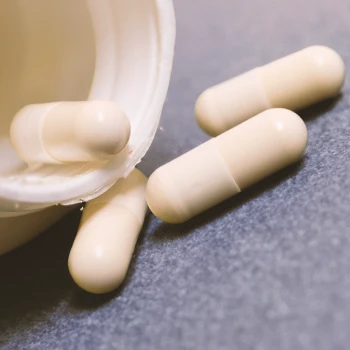
Andrew Huberman highly recommends magnesium threonate for sleep enhancement. I've found magnesium threonate to be highly effective in improving sleep quality among my patients.
According to the Nutrients, this form of magnesium effectively crosses the blood-brain barrier, aiding in sleep and cognitive function by promoting relaxation and increasing brain magnesium levels [12].
Dr. Huberman recommends 2000 mg of magnesium threonate, which gives 145 mg of elemental magnesium.
Apigenin
Apigenin is a naturally occurring chemical that belongs to the flavonoid class, which are plant-based substances having antioxidant and anti-inflammatory activities.
As per Dr. Andrew Huberman, apigenin can operate as an anxiety-reducing ingredient, essential for supporting better sleep.
Apigenin aids individuals to silence their brains and reduces the amount of ruminating ideas, problem-solving, and future expectations that could interfere with falling asleep by lowering anxiety levels.
Apigenin has been examined for its sedative properties and its use as a sleep aid. It interacts with particular brain receptors, such as GABA receptors, associated with promoting relaxation and sleep [13].
Theanine
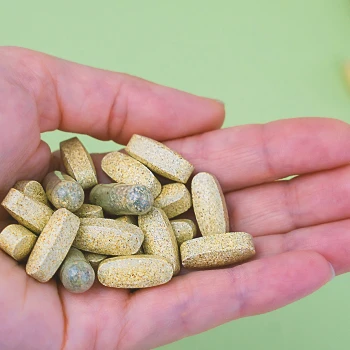
L-theanine, found in tea leaves and mushrooms, is an amino acid that enhances brain health.
According to the Nutrients, it's absorbed rapidly, crosses the blood-brain barrier, and boosts neurotransmitters like GABA, dopamine, and serotonin, which are crucial for regulating mood, sleep, and focus [14].
It also generates relaxation by interacting with alpha brain waves.
Dr. Huberman believes that taking theanine in doses that range from 100 to 400 mg can help people fall asleep more quickly.
Glycine
As per Dr. Andrew Huberman, glycine is a vitamin that can help you sleep better.
Glycine is mentioned as one of the substances that can assist in improving sleep quality and managing particular sleep issues.
Glycine is an amino acid that operates as an inhibitory neurotransmitter in the brain. It is important to balance the rhythm of sleep-wake cycles and encourage relaxation [15].
Glycine has been shown to improve sleep latency (the time it is required to fall asleep), sleep quality, and general sleep architecture.
GABA
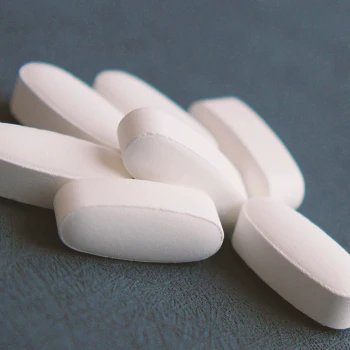
GABA is a neurotransmitter that governs several sedative and depressive activities and is vital for relaxing.
GABA's major advantages are its sedative and soothing properties, and studies have shown that it enhances sleep quality and decreases anxiety, according to the National Library of Medicine [16].
Dr. Andrew Huberman recommends GABA (gamma-aminobutyric acid) as a supplement he uses every third or fourth night to help him fall asleep.
He claims to take 100 mg of GABA in addition to his usual sleep stack of theanine, magnesium threonate, and apigenin.
Myo-Inositol
Myo-inositol is an organic molecule in the vitamin B family.
It is essential for several physiological activities in the body, including cell communication, protecting against cognitive decline, signaling of insulin, and neurotransmitter modulation.
It has been researched for its possible effects on anxiety, mood, and sleep [17].
"Taking 900 mg of Myo-Inositol may help you go back to sleep faster if you wake up in the middle of the night."
- Dr. Andrew Huberman, American Neuroscientist
Longevity Supplement

NMN
Huberman reveals that he uses Renue by Science NMN sublingually and takes 1 gram. Based on my experience, NMN supplements have shown potential in promoting longevity and overall health.
NMN, or nicotinamide mononucleotide, is a naturally occurring molecule that transforms into nicotinamide adenine dinucleotide (NAD+).
According to the Frontiers in Cell and Developmental Biology, NAD+ affects DNA repair, energy consumption, gene expression, and cell stress reactions [18].
It is advisable to supplement with 500-1000 grams of NMN daily because it naturally diminishes as we age.
Other Supplements Andrew Huberman Takes

The Andrew Huberman supplement list does not end here. Dr. Huberman recommends a few extra supplements that might be added to your regular regimen.
Incorporating supplements like Vitamin K2 and Ashwagandha, as recommended by Huberman, has been beneficial in my practice.
These include:
- Vitamin K2: beneficial to cardiovascular health.
- Athletic Greens: have a wide range of micronutrients.
- Rhodiola rosea: an 'adaptogen' that can help with fatigue.
- Ashwagandha: an 'adaptogen' that can help with stress management.
- Multivitamins: provide a wide range of vitamins and minerals.
- Acetyl L-carnitine: This supplement may aid with weight reduction, depression, and male fertility.
- Cissus quadrangularis: a serotonin enhancer.
- Nicotine: used to improve attention and concentration.
- Turkesterone: has moderate anabolic characteristics.
Supplements Andrew Huberman Avoids
- Melatonin
- Tribulus
- 5-HTP & Tryptophan
Celebrity Stats/Career Highlights

- Age: 48 years
- Height: 5 feet 7 inches
- Weight: 172 lbs (78 kgs)
- Waist: 33 inches
- Chest: 42 inches
Workout Routine
Andrew Huberman doesn't work out only for the sake of aesthetics. He exercises to move better, be stronger, be injury-free in everyday life, and function effectively physically and cognitively.
Implementing a workout routine similar to Huberman's has been effective in maintaining my and my patient's physical and mental well-being.
Here's Andrew Huberman's workout routine:
Monday: This day, he works his legs with up to three sets of 5 to 12 repetitions and two workouts per muscle group.
Tuesday: Huberman rests in a 260-degree sauna. Heat and cold exposure help recovery, enhance mood and growth hormones and develop tolerance to heat and cold.
Wednesday: Huberman runs for 20-30 minutes, covering as much ground as possible (70-80% effort). This will help with muscular endurance, VO2Max (cardiovascular fitness), and stamina.
Thursday: This push session is divided into two parts:
- Concentric movement (lifting the weight) = Try to be as explosive as possible.
- Lowering eccentric phase movement = Be as slow and managed as possible (2 to 5 seconds).
Friday: He strives for speed, explosiveness, and maximum heart rate here. This workout is only 15 minutes, but it is intense.
Saturday: During this session, Huberman focuses on tiny muscular groups such as the biceps, triceps, and rear deltoids. This is beneficial not just for hypertrophy but also for injury avoidance.
Sunday: The primary goal of this session is to be outside. So he puts on a good weight vest and jogs at a steady speed for 70-90 minutes. He could decide to go hiking with friends.
Workout Principles

Huberman defines his workout system as the Foundational Fitness Protocol.
This type of training focuses on fitness goals such as strength, endurance, cardiovascular, and hypertrophy fitness.
For strength, it alternates between 3 to 4 sets of 4 to 8 repetitions and 2 to 4 minutes of rest.
There are also 2 to 3 sets of 8 to 15 repetitions with a two-minute pause for hypertrophy while working all muscle groups.
Diet Plan

Below is Andrew Huberman's diet plan.
Adopting a diet plan akin to Huberman's has positively impacted my health and that of my patients.
Meal 1: (low carb)
- Oatmeal
- Fruit
- Ground beef or steak
- Vegetables
- Eggs
Meal 2:
- Nuts (almonds and brazil nuts)
- Supplements (Athletic Greens and whey proteins)
Meal 3:
- Pasta
- Salad
- Rice bowl
- Tuna
Diet / Nutrition Principles
Huberman observes intermittent fasting, which limits his meals to a certain period each day.
He often waits 6-8 hours after waking up for his first meal. In the interim, he will drink water, occasionally with salt, to satisfy his appetite.
He normally avoids coffee for one or two hours after getting up to avoid a caffeine crash later on.
He will normally stick to protein and beneficial fats for his first meal, but if he trains exceptionally hard in the early hours, he will take carbohydrates such as porridge or rice.
He normally has a protein smoothie or a handful of almonds for his second meal.
Huberman approaches dinner in the other direction, eating light on protein and big on carbohydrates.
He takes a multivitamin, vitamin D pills, and fish oil and always drinks lots of water first thing in the morning.
FAQs
What Creatine Does Huberman Use?
The form of creatine that Huberman uses is creatine monohydrate. He claims that he takes 5 grams of this product daily.
What Multivitamin Does Huberman Recommend?
The multivitamin that Huberman recommends is Athletic Greens. Huberman declares that if you are searching for a single supplement and have money, you should go with this product because it offers you everything.
References:
- https://pubmed.ncbi.nlm.nih.gov/16281088/
- https://www.sciencedirect.com/science/article/abs/pii/S0367326X10000845
- https://pubmed.ncbi.nlm.nih.gov/36013514/
- https://pubmed.ncbi.nlm.nih.gov/376793/
- https://pubmed.ncbi.nlm.nih.gov/34311679/
- https://pubmed.ncbi.nlm.nih.gov/21129941/
- https://www.ncbi.nlm.nih.gov/pmc/articles/PMC8235064/
- https://www.ncbi.nlm.nih.gov/pmc/articles/PMC3904499/
- https://www.ncbi.nlm.nih.gov/pmc/articles/PMC6084775/
- https://ods.od.nih.gov/factsheets/Omega3FattyAcids-Consumer/
- https://pubmed.ncbi.nlm.nih.gov/33255790/
- https://www.ncbi.nlm.nih.gov/pmc/articles/PMC9786204/
- https://www.ncbi.nlm.nih.gov/pmc/articles/PMC6472148/
- https://www.ncbi.nlm.nih.gov/pmc/articles/PMC6836118/
- https://pubmed.ncbi.nlm.nih.gov/16095452/
- https://www.ncbi.nlm.nih.gov/books/NBK526124/
- https://pubmed.ncbi.nlm.nih.gov/32933356/
- https://www.ncbi.nlm.nih.gov/pmc/articles/PMC7198709/
About The Author
You May Also Like

